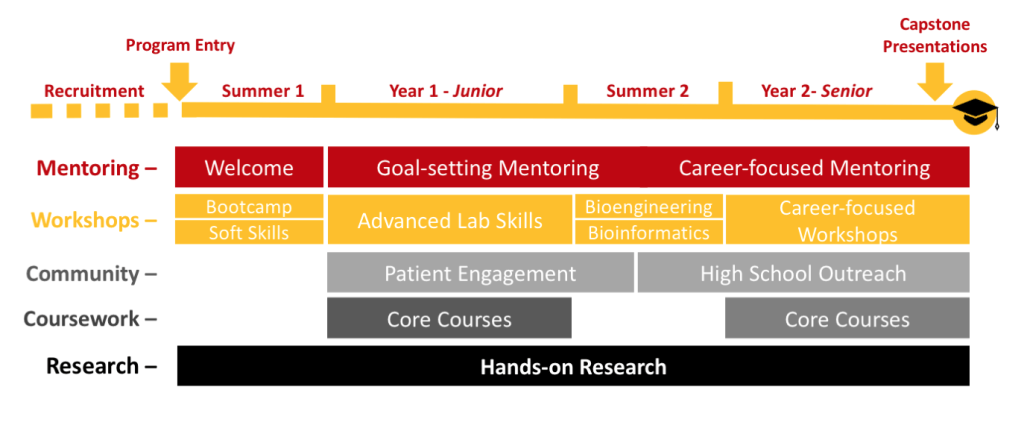
During their junior and senior years, COMPASS scholars will engage in a training program with 2 summers of intensive research and 2 academic years including mentoring, complementary workshops on scientific and career topics, community engagement, coursework and an independent hands-on research project.
Mentoring: Scholars will enter the program in the summer after their sophomore years and be introduced to Internal Mentors (experts in their fields of research at USC) and External Mentors (professionals across the nation whose expertise spans business, education, and basic and clinical research). These mentors will assist in stewarding students through the program through a series of workshops and discussions.
Workshops: USC COMPASS will start with a summer “Bootcamp” involving both in-classroom activities and hands-on laboratory training. The goal of the Bootcamp will be to prepare Scholars to interview and apply for their laboratory research internships where they will carry out their capstone projects. Workshops during the first academic year will focus on goal-setting and academic coaching. Scholars will also participate in a journal club and research skills workshops covering scientific communication, ethical research practice, data management, and statistical analysis. In the second year, Scholars will attend workshops on ethics in stem cell research, diversity in research, and career sessions on postgraduate academic programs, job application materials, professional development, networking, and STEM career options.
Community: Scholars will also participate in outreach programs with local high schools or community colleges and learn about the patient experience through engagement with patients and/or patient advocacy groups.
Coursework: Scholars will receive formal instruction through credited coursework (12 units total) that will provide a foundational understanding of stem cell and regeneration biology; courses will count toward the bachelor’s degree and, if desired, can be used to satisfy requirements for a Minor in Stem Cell Biology and Regenerative Medicine.
Research: Internships will start in the first summer and then continue through the following two years culminating in a capstone project. In the second summer, Scholars will engage in complementary training including a gene editing and CRISPR/Cas9 workshop and a mini-project employing bioinformatics and/or bioengineering techniques. During the second year, Scholars will be able to choose a concentration including biotechnology, basic/translational stem cell research, biomedical engineering, computational biology, business, journalism, or GMP manufacturing. At the conclusion of the program, Scholars will showcase their capstone projects at the USC COMPASS Symposium.
